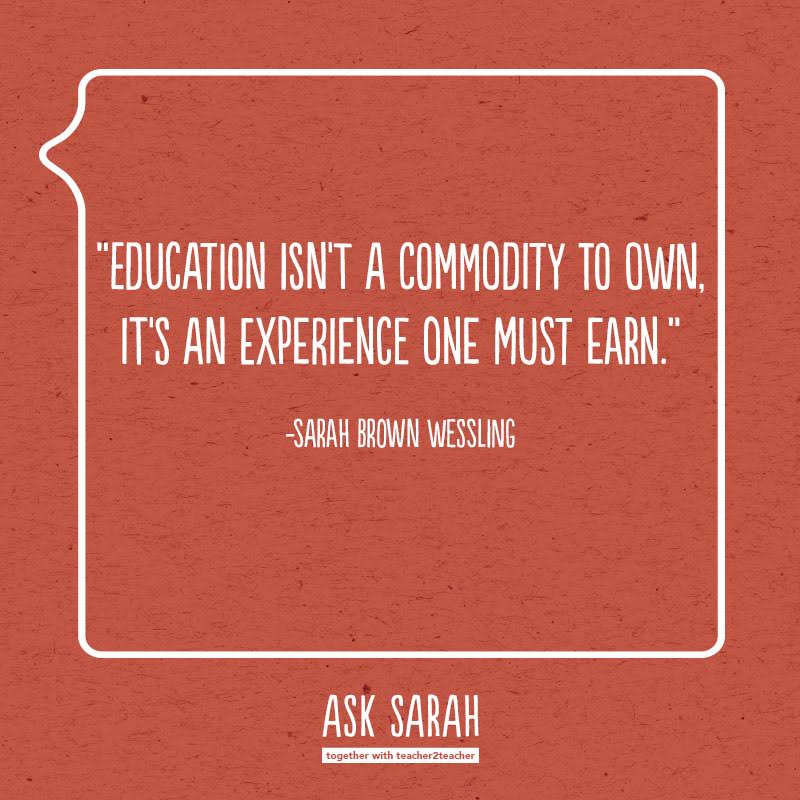
Dear Sarah,
If I don’t grade an assignment, my students won’t do it. But that can be so overwhelming. What can I do?
Sincerely,
I Can’t Grade It All
Dear I Can’t Grade It All,
M&M’s. The answer is M&M’s. It’s a familiar scenario: I walk by a bowl of M&M’s and think to myself, “I’ll just take one or two.” Then I tell myself, “I might as well just have one of each color.” Soon I rationalize, “They’re so small, almost inconsequential. A handful won’t hurt.” Before I know it, I’ve justified eating a better part of that entire bowl. And frankly, more dangerous than the candy itself, is the habit of justification I keep feeding.
I’m sure you’re wondering what my chocolate habit has to do with your very real, very common dilemma about how to keep your students motivated to do the work without grading everything. I think it comes down to what happens when we feed the monster of justification. Somewhere along their experience, we’ve taught students that their education is a commodity. You know what I mean: they write words, we give them points. They write more words, we give them more points. But education isn’t a commodity to own, it’s an experience one must earn.
I know you’re used to working late into the night and getting up early in the morning to feed that monster. You’re grading everything, assigning points, using this to keep students engaged in their learning. Yet, each point is becoming more and more like one of my chocolate bites: seemingly inconsequential, a sweet rationalization, a lulling into justification. I know you have your students’ very best interests in mind, but without realizing it, you may be undermining yourself and them.
What would happen if you didn’t grade everything? At first, it might be rough. They might complain, push-back or flirt with disengagement. Some may even withdraw, believing there’s no longer a reason to do homework. But this is exactly where you get to be the amazing teacher I know you are. This is where you teach them that grades are ambiguous and they are above ambiguity. Here’s where you tell about the time you got an “A” in a class and didn’t learn anything and that other time you got a “C” in one and learned more from that teacher than any other.
This is where you dig and find the real purpose for what they’re learning. Help them see they’re not doing this assignment for points or because it will be on the test or because they’ll need it next year. Those are M&M reasons and they need intrinsic ones. They need to know how this works their brain in a new way, how this will help them think for themselves, how it will help them make connections to other subjects and in their own lives.
I don’t grade everything. I can’t. I try to give feedback every day, though. Some days it’s to the whole class about a pattern I’ve noticed in their collective work. Some days it’s going around group to group re-directing or asking new questions. Other days it’s one-on-one conferences or through the written feedback I offer on the work they each turn in. Most of this is ungraded because I’ve learned that once I put a grade on an assignment the Godfather principle takes hold: it’s dead to them. That grade is a crossed finish line when we’ve only just begun.
I’m sure you’re thinking what I do at the beginning of every school year: this sounds nice, but it won’t actually work with real kids in a real classroom. It’s true, some kids won’t do their work at first, but they probably weren’t going much beyond compliance before. As you come to believe it and act upon it, your students will follow your lead, especially when they get used to hearing each day why they’re actually learning this.
Early each semester I give this grade talk to my classes that gets really specific about how I merge my own belief system with the reality of assigning points and grades. I also think back to former students, many of whom were incredibly resistant during class, who reach out later to tell me they finally “got it.” I hold onto words like Ben’s, a former student I recently interviewed, who started telling me about the danger of grades.
And no matter how hard it is to resist, I remember that my students can’t earn their education if I hand it to them like a bowl of M&M’s.
Teach openly,
With Teacher2Teacher




Sometimes I collected work, recorded it, put a check on it and returned it. My classes had a built in credit for volume consideration. Also, sometimes, I would check one specific and higher level problem to make sure they got the learning. There should be at least one specific problem that shows comprehension. I think it was Harry K. Wong who wrote, “the person who does the work does the learning.”
Hi Pat,
Thank you so much for joining in on the conversation. I really like the idea of looking at some targeted pieces of work and how that can also help target our feedback. I have certainly learned that more is not always better.
Thanks,
Sarah
Here is an idea: If the students are answering questions from the book, just have them do the problems at the bottom of the page. Generally the problems get harder the farther down the page they appear. If they can do the ones at the bottom of the page, they can do all of them. And be sure to do pre-testing so you know which students need just a little work on specific skills, which students know all the subject matter so they can move on to independent projects, and which ones need every bit of your time and help.
Hi Ann,
Thank you for reminding us about the importance of focusing on specific skills. Sometimes it can all get so overwhelming and finding that first skill to focus on can really help re-center!
Sarah
I like the sentiments expressed in the blog and the Grade Talk video but practice and work habits should NOT be part of an (English) grade. We do a brilliant job of training students into the “does this count syndrome” and we have to train them out of it if we want them to be learners by not giving points for practice and work habits. Grades should come entirely from summative assessments, i.e., demonstrated skills and understandings.
Hi Ken,
I always value your insight and perspective and am grateful you’d bring it to bear on this conversation/post. I entirely agree that we have to be very vigilant about how we train our students to understand the different roles that grades and feedback, product and process play in our classrooms. One of the most important ways I aim to do this very thing has nothing to do with the system at all. In short, I talk about grades as little as possible. At every turn, I talk about learning. When parents come to conferences, I won’t lead with grades, but with how their student is learning or not learning. What’s tricky (and I think a reason for the sloth-like pace our high schools around the country are changing when it comes to grades) is that we have to be able to bring students and parents along on this journey. And that journey is fraught with baggage because we’ve internalized that grades and percentile points and class rankings are one’s identity.
So, for me, I’m never just changing how I report learning, I’m also confronting identity crises that emerge from those changes. Which all means that it takes time. And it takes concessions. I concede work habit grades if I can use them to change how you think about what it means to be present in our classroom. I concede practice points if it means that I teach them to use feedback even when assignments have no points attached to them at all.
I know I’m in the muck on this journey, but I hope concessions aren’t capitulations and points are never more important than people. Thank you for challenging ALL of us to think bigger, work smarter and get better.
Sarah
Hi Sarah,
Thanks for the kind words and for identifying some of the realities that make change difficult. Your concessions aren’t capitulations; they are sensible steps along the journey to effective grading practices. Talking about learning, not grades with students and parents is really important, because changing the conversation challenges and changes their thinking. From what you said about the baggage they bring I believe even more now that it is essential that schools eliminate class rank and only having one valedictorian.
Catherine,
I think the way you are constantly in contact with your students’ writing really helps when you finally get the longer pieces to respond to. And there’s implicit reflection when we ask them to choose and vet. It sounds like you’re really “beside” your learners and writers. Thanks for sharing!
Sarah